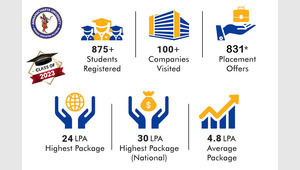Department
Computer Science and Engineering (Artificial Intelligence)
Research Committee
A research committee in a private university typically plays a crucial role in promoting and overseeing research activities within the institution. Its responsibilities and structure can vary depending on the university’s size, research focus, and specific policies. Below is an overview of what a research committee might entail:
Roles and Responsibilities
- Research Policy Development
- Grant and Funding Oversight
- Research Quality and Compliance
- Research Development and Support
- Evaluation and Monitoring
- Ethics and Integrity
Composition of the Committee:
- Chairperson:
- Usually a senior faculty member or administrator with significant research experience, responsible for leading the committee and coordinating its activities.
- Faculty Members:
- Representatives from different departments or schools within the university, ensuring a diverse perspective on research matters.
- Members are often selected based on their research expertise and contributions to their fields.
- External Members:
- In some cases, the committee might include external experts, such as industry professionals or researchers from other institutions, to provide additional insights.
- Student Representatives:
- Some universities include graduate or postgraduate student representatives to ensure student research interests are considered.
- Administrative Staff:
- Administrative support is usually provided by staff who assist with organizing meetings, maintaining records, and communicating decisions to the broader university community.
Reporting and Accountability:
- The research committee usually reports to a higher academic authority, such as the university’s academic council, provost, or board of trustees.
- Regular reports on research activities, achievements, and challenges are often required to ensure transparency and alignment with the university’s goals.
In a private university, the research committee plays a pivotal role in advancing the institution’s research agenda, contributing to academic excellence, and enhancing the university’s reputation in the broader academic and research communities.
Constitution of Departmental Research Committee (DRC) – AY [2025–2026]
| Sl. No. | Name of the Faculty | Designation | Role |
| 1 | Dr. N Penchalaiah | Head of the Department | Chairperson |
| 2 | Dr. T Hari Krishna | Associate Professor | Senior Member |
| 3 | Dr. C V Lakshmi Narayana | Assistant Professor | Senior Member |
| 4 | Mr. N Siva | Assistant Professor | Member |
| 5 | Dr. J Krishna | Department Research Coordinator | Member Secretary |





